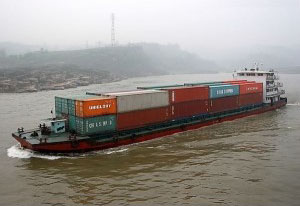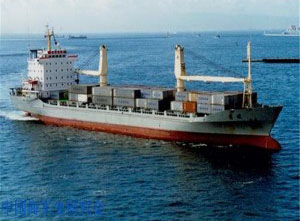BLOG
How Many 40ft Containers Fit on a Cargo Ship?
Container shipping is a crucial element of global trade, and understanding how many containers can fit on a cargo ship is essential for logistics and planning. The most common container used in shipping is the 40ft container. This container size is widely used in the transport of goods by sea due to its ample space and compatibility with international shipping standards.
For companies like Peida Machinery Group Co., Ltd., which is a leading player in the design and construction of container ships, passenger ships, oil tankers, and various engineering ships, container capacity is a crucial aspect of the shipping process. Based in China’s Yangtze River region, Peida Machinery Group focuses on providing solutions for bulk shipping, inland river container ships, and second-hand ships, all of which meet the requirements of various Classification Societies.
How Many 40ft Containers Fit on a Cargo Ship?

Inland river container ship
Cargo ships come in many sizes and types. The number of 40ft containers that can fit on a cargo ship depends on the size and capacity of the vessel. A standard 40ft container, known as a TEU (Twenty-Foot Equivalent Unit), plays a vital role in shipping calculations. Here’s a brief breakdown:
- Ultra Large Container Vessels (ULCV) can carry up to 21,000 TEUs.
- Panamax vessels carry about 5,000 TEUs.
- Feeder vessels, which are much smaller, typically carry between 300 to 1,000 TEUs.
For Peida Machinery Group’s 48 TEU river container ship, the container capacity is specific to its inland shipping function. This ship is built with a total length of 62 meters and a width of 10 meters, allowing for the efficient transport of goods along inland routes.
Factors Affecting Container Capacity on Cargo Ships
Several factors affect how many 40ft containers a ship can carry, including:
- Ship size and design: Larger ships can naturally carry more containers. ULCVs are the giants of the sea and have the greatest capacity.
- Weight of cargo: Heavier cargo may reduce the number of containers a ship can safely transport.
- Draft and ballast: The draft, or the depth of water a ship requires, can limit the number of containers, especially in shallower waters or along inland routes like those serviced by Peida Machinery Group’s inland river container ships.
- Load distribution: Proper load distribution ensures the ship’s balance and stability during its voyage.
The Role of Peida Machinery Group in Container Shipping
Peida Machinery Group Co., Ltd. is a versatile company based in China’s Yangtze River region, a hub for international and inland shipping. They specialize in producing various types of vessels, including container ships, passenger ships, oil tankers, and more. Their 48 TEU river container ship is specifically designed for inland waterway transport, which is crucial for connecting smaller ports and inland areas with major international shipping routes.
Key Specifications of the 48 TEU Inland River Container Ship:

- Total length: 62.00 meters
- Length between perpendiculars: 58.50 meters
- Width: 10 meters
- Depth: 3.2 meters
- Design draft: 2.4 meters
- Rib spacing: 0.6 meters
- Ship engine: Two sets of Weichai X6160Z engines with a combined power of 235KW, enabling a speed of 18 km/h.
- Generator: One 40KW and one 24KW generator.
The 48 TEU river container ship is an example of Peida Machinery Group’s dedication to creating vessels that meet the unique needs of their clients, from inland shipping routes to large-scale bulk transportation.
The Importance of Inland Shipping
Inland shipping plays a critical role in global trade, especially in regions where river networks are used for transport. These ships, like Peida Machinery Group’s 48 TEU inland river container ship, are designed to navigate the narrower and shallower waters of inland routes while carrying a significant number of containers.
Benefits of Inland Shipping:
- Cost-effective: Inland shipping is often more economical than road or rail transport, especially for large quantities of goods.
- Environmentally friendly: Shipping by water produces fewer emissions than other forms of transportation.
- Accessibility: Inland container ships provide access to regions that may not be connected to major ocean ports.
Frequently Asked Questions (FAQs)
1. What is the typical capacity of a 40ft container?
A standard 40ft container can hold around 2,400 cubic feet of cargo. The weight capacity is about 67,200 pounds (30,480 kg), but this depends on the type of goods being transported.
2. How many 40ft containers fit on an Ultra Large Container Vessel (ULCV)?
An Ultra Large Container Vessel (ULCV) can fit up to 21,000 TEUs, though the exact number may vary depending on cargo weight and ship design.
3. What is the significance of the TEU in shipping?
A TEU (Twenty-foot Equivalent Unit) is a standard measure used to determine the capacity of container ships. While a 20ft container equals one TEU, a 40ft container is equivalent to two TEUs.
Table: Comparison of Different Container Ship Sizes and Capacities
| Type of Cargo Ship | Length (meters) | Width (meters) | Max TEU Capacity | Common Routes |
|---|---|---|---|---|
| Ultra Large Container Vessel (ULCV) | 400m | 59m | 21,000 TEUs | Major international routes |
| Panamax Vessel | 294m | 32m | 5,000 TEUs | Panama Canal routes |
| Feeder Vessel | 120m | 22m | 300-1,000 TEUs | Regional/inland routes |
| Peida Inland River Container Ship | 62m | 10m | 48 TEUs | Inland river routes |
Final Toughts
Understanding how many 40ft containers fit on a cargo ship is essential for logistics planning in global trade. Whether you are transporting goods via ULCVs or using smaller feeder vessels like Peida Machinery Group’s 48 TEU inland river container ships, the capacity of your vessel is key to efficient shipping. With their vast expertise in producing ships that meet the diverse needs of clients, Peida Machinery Group remains a trusted partner in the shipping industry.
BLOG
News
Contact Us
Contact: Peida Machinery Group Co. ,Ltd.
E-mail: info@peidaship.com
Tel: 0086 0556 5248992
Phone: 008618855615637
Add: City Anqing, Anhui Province